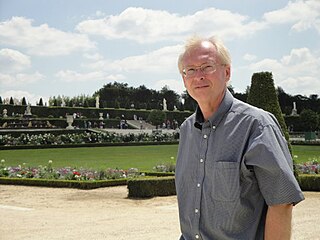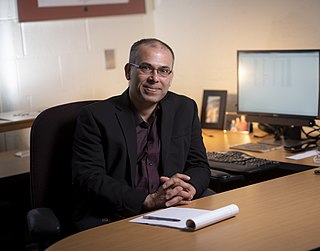Related Research Articles

Eugene Howard Spafford, known as Spaf, is an American professor of computer science at Purdue University and a computer security expert.
Samuel Standfield Wagstaff Jr. is an American mathematician and computer scientist, whose research interests are in the areas of cryptography, parallel computation, and analysis of algorithms, especially number theoretic algorithms. He is currently a professor of computer science and mathematics at Purdue University who coordinates the Cunningham project, a project to factor numbers of the form bn ± 1, since 1983. He has authored/coauthored over 50 research papers and four books. He has an Erdős number of 1.

Dorothy Elizabeth Denning is a US-American information security researcher known for lattice-based access control (LBAC), intrusion detection systems (IDS), and other cyber security innovations. She published four books and over 200 articles. Inducted into the National Cyber Security Hall of Fame in 2012, she is now Emeritus Distinguished Professor of Defense Analysis, Naval Postgraduate School.
Victor Raskin is a distinguished professor of linguistics at Purdue University. He is the author of Semantic Mechanisms of Humor and Ontological Semantics and founding editor of Humor, the journal for the International Society for Humor Studies.
Discovery Park is a 40-acre (160,000 m2) multidisciplinary research park located in Purdue University's West Lafayette campus in the U.S. state of Indiana. Tomás Díaz de la Rubia, an energy and resources industry executive who also spent a decade as a top scientist and administrator at Lawrence Livermore National Laboratory, serves as Discovery Park's Vice President.
Elisa Bertino is a professor of computer science at Purdue University and is acting as the research director of CERIAS, the Center for Education and Research in Information Assurance and Security, an institute attached to Purdue University. Bertino's research interest include data privacy and computer security.

The Khoury College of Computer Sciences is the computer science school of Northeastern University in Boston, Massachusetts. It was the first college in the United States dedicated to the field of computer science when it was founded in 1982. In addition to computer science, it specializes in data science and cybersecurity. The college was also among the first to offer an information assurance degree program.

The Center for Education and Research in Information Assurance and Security (CERIAS) of Purdue University, United States, is a center for research and education in areas of information security for computing and communication infrastructures.
The National Cyber Security Hall of Fame, founded by Larry Letow and Rick Geritz, was established in 2012 to recognize the contributions of key individuals in the field of cyber security; its mission statement is, Respect the Past - Protect the Future. According to its website, it is designed to honor the innovative individuals and organizations which had the vision and leadership to create the fundamental building blocks for the cybersecurity Industry. The organization also highlights major milestones in the industry's 40-year history through a timeline representation, which includes inductees and their corresponding accomplishments.

Daniel M. Fleetwood is an American scientist, inventor, engineer and innovator. He is credited as being one of the first to identify the origins of flicker noise in semiconductor devices and its usefulness in understanding the effects of ionizing radiation on microelectronic devices and materials.
Almyra Oveta Fuller was an associate professor of microbiology and immunology at University of Michigan Medical School. She served as the director of the African Studies Center (ASC), faculty in the ASC STEM Initiative at the University of Michigan (U-M) and an adjunct professor at Payne Theological Seminary. Fuller was a virologist and specialized in research of Herpes simplex virus, as well as HIV/AIDS. Fuller and her research team discovered a B5 receptor, advancing the understanding of Herpes simplex virus and the cells it attacks.

Nadarajah Asokan is a professor of computer science and the David R. Cheriton Chair in Software Systems at the University of Waterloo's David R. Cheriton School of Computer Science. He is also an adjunct professor in the Department of Computer Science at Aalto University.
Catherine Ann Meadows is an American cryptographer known for her development of tools for the formal verification and automated discovery of flaws in cryptographic protocols. She is a senior researcher in the Center for High Assurance Systems at the Naval Research Laboratory and the head of the laboratory's Formal Methods Section.
Karthik Ramani is an Indian born American researcher, mechanical engineer, and entrepreneur. He is the Donald W. Feddersen Distinguished Professor of Mechanical Engineering at Purdue University, with courtesy appointments in Electrical and Computer Engineering and Educational Studies in the College of Education. Previously, from 2001-2008, he was the Director of the Center for Information Sciences in Engineering at Purdue University.
Jiliang Tang is a Chinese-born computer scientist and associate professor at Michigan State University in the Computer Science and Engineering Department, where he is the director of the Data Science and Engineering (DSE) Lab. His research expertise is in data mining and machine learning.
Ibrahim "Abe" Moussa Baggili is a cybersecurity and digital forensics scientist at Louisiana State University with a joint appointment between the college of engineering and the Center for Computation and Technology. Before that, he was the founder and director of the Connecticut Institute of Technology (CIT) at the University of New Haven. Baggili was also a full professor and Elder Family Endowed Chair at UNewHaven. He has a B.S., M.S., and Ph.D. in Computer and Information Technology from Purdue University's Purdue Polytechnic Institute. Baggili is a Jordanian/Arab American first generation college graduate and a well-known scientist in the domain of Cyber Forensics and Cybersecurity with seminal peer-reviewed work in the areas of Virtual Reality Forensics (VR) and security, mobile device forensics and security, application forensics, drone forensics and memory forensics.

Saurabh Bagchi is an Indian-born American academic researcher and educator in the area of computer science and engineering. He is a professor of Electrical and Computer Engineering and Computer Science at Purdue University. His contributions have been in the area of reliability and security of distributed computing systems and Internet-of-Things (IoT).
Debdeep Mukhopadhyay is an Indian cryptographer and professor at the Department of Computer Science and Engineering of the Indian Institute of Technology Kharagpur. He was awarded the Shanti Swarup Bhatnagar Award for Science and Technology, the highest science award in India, in 2021 for his contributions to micro-architectural security and cryptographic engineering. Debdeep Mukhopadhyay's research interests include Hardware security, Cryptographic Engineering, Design Automation of Cryptosystems, VLSI of Cryptosystems, and Cryptography. He has authored several textbooks, including Cryptography and network security, which has been cited 1227 times, according to Google Scholar. He was elevated to the Fellow of Indian National Academy of Engineers in 2021.
Seny Kamara is a Senegalese-French-American computer scientist best known for his work on cryptography. He has delivered multiple congressional testimonies about the potential harms and opportunities with technology. He leads or co-leads numerous centers and activities focused on cryptography and social good. His work has been covered extensively in high-profile media, including Wired and Forbes.
References
- ↑ "VACCINE - Purdue University" . Retrieved 9 November 2019.
- ↑ "CERIAS - Center for Education and Research in Information Assurance and Security - Purdue University" . Retrieved 9 November 2019.
- 1 2 "User profiles for DS Ebert". Google Scholar. Retrieved May 8, 2020.